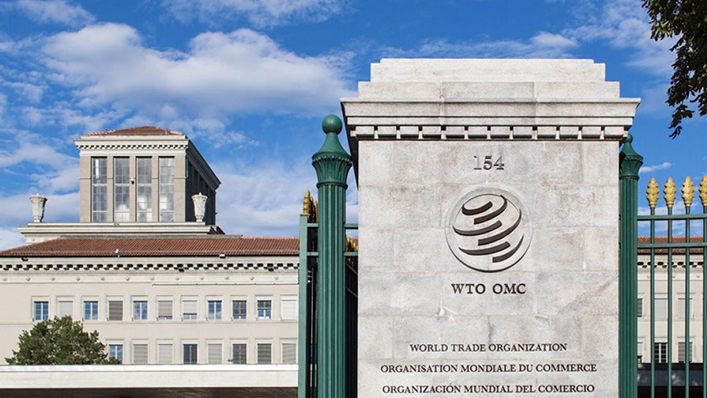
Editor's note: Alexandr Svetlicinii is Associate Professor of Law at the University of Macau, where he also serves as program coordinator for the Master of Law in International Business Law in English Language. The article reflects the author's opinions, and not necessarily the views of CGTN.
On June 16, 2020, the World Trade Organization (WTO) published a panel report, which concluded the dispute between Qatar and Saudi Arabia in relation to the protection of the intellectual property rights (IP) of a Qatari broadcasting company in Saudi Arabia. The case is the second time a WTO panel has considered the security exception invoked as a defense for deviation from the international trade rules enshrined in the WTO agreement. While both sides have declared themselves winners in the case, it is important to clarify the WTO's ruling, especially since it will have an effect on future security-related trade disputes.
The dispute refers to the 2017 diplomatic crisis between Qatar and certain members of the Gulf Cooperation Council, which introduced various forms of trade and travel restrictions against Qatari citizens and companies. Qatar has disputed the trade-restrictive measures undertaken by Bahrain, Saudi Arabia and the United Arab Emirates before the WTO. In the present case, which was brought under the terms of the Agreement on Trade-Related Aspects of Intellectual Property Rights (TRIPS), Qatar complained that Saudi Arabia did not ensure the required level of protection of IP rights. The panel has examined two types of the alleged violations of the TRIPS Agreement: (a) restricting access for Qatari company to the legal counsel in Saudi Arabia to represent it in civil procedure before the Saudi court and (b) failing to initiate criminal investigation against a Saudi company, which broadcasted the IP-protected content of the Qatari company without authorization.
Saudi Arabia has attempted to excuse its actions by invoking a security exception enshrined in the TRIPS and other WTO agreements. This exception allows any WTO member to take actions "which it considers necessary for the protection of its essential security interests … taken in time of war or other emergency in international relations." In relation to the first claim, the WTO panel has recognized Saudi Arabia's right to protect its essential security interests and limit any contacts with Qatari nationals and companies, which prevented a Qatari company from obtaining legal counsel in Saudi Arabia. In relation to the second claim, the WTO panel has found no connection between the security interests of Saudi Arabia and its failure to initiate criminal proceedings against the company, which infringed the IP rights of the Qatari broadcaster.

A mosque in Doha, Qatar, June 15, 2017. /VCG
A mosque in Doha, Qatar, June 15, 2017. /VCG
The panel's ruling has confirmed that although the "essential security interests" of a WTO member can justify the adoption of trade-restrictive measures, such actions should be genuinely related to the protection of the defined security interests. As a result, the WTO panel has reaffirmed its competence to review the invocation of security exceptions in trade disputes and demonstrated its capacity to examine whether the trade restrictions were imposed by the WTO members in "good faith" for the protection of their national security. This approach is in line with China's 2019 proposal on WTO reform calling the WTO members "to act in good faith and exercise restraint in invoking provisions on national security exceptions."
The case is also notable for the opinions of the third parties, which submitted their views to the panel. The majority of the third parties in this case, including Australia, Brazil, Canada, China, the EU, and Japan supported the competence of the WTO panels to review the security exceptions in the trade disputes. A smaller group of countries including the United States, Bahrain, and Saudi Arabia insisted that the WTO cannot "second-guess" the countries' determination of their security interests or the actions necessary for their protection. This divergence of opinions and active participation of the major WTO members in the present case demonstrate the growing concerns over the increasing number of trade restrictions that are being justified by security reasons.
However, despite the strong support for the WTO dispute settlement mechanism coming from major WTO members, the functioning of the Appellate Body remains to be paralyzed due to the refusal of the United States to proceed with the appointment of its members. The recent introduction of the Multi-party Interim Appeal Arbitration Arrangement by a group of 16 WTO members including China and the EU, provides for a temporary solution, which will allow the participating countries to appeal the WTO panel's decisions before an arbitration tribunal.
(If you want to contribute and have specific expertise, please contact us at opinions@cgtn.com.)